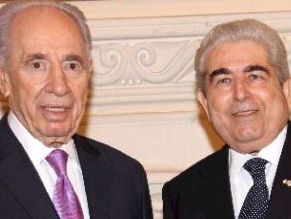|
World Jewish News

Israel's President Shimon Peres (L) with Cyprus President Demetris Christofias on Thursday in Nicosia.
|
Israeli President Peres says gas finds no threat to Turkey
03.11.2011, Israel and the World Visiting Israeli President Shimon Peres said in Cyprus on Thursday that gas finds in the Mediterranean Sea were no threat to Turkey but a positive step for the region.
"We are going to use the gas the way peaceful and democratic people should use it," said Peres during an official visit to the eastern Mediterranean island, whose maritime exclusive economic zone borders that of Israel.
"We are not going to waste it, we are not going to play with it, we are not going to use it for the wrong purposes," he added.
In December, Cyprus and Israel signed an agreement defining their maritime border that allows the neighbours to forge ahead in the search for energy resources in the eastern Mediterranean.
At the end of September, US firm Noble Energy began exploratory drilling for gas off divided Cyprus's southern coast, ignoring Ankara's warnings that Turkey would retaliate by launching its own explorations in the area.
Meanwhile, Turkey's relations with Israel have worsened since May 2010, when Israeli commandos stormed a convoy of six ships trying to reach the Gaza Strip in defiance of an Israeli naval blockade, killing nine Turkish activists.
Israel's closer ties with Cyprus in the energy field have strained relations with Ankara even further.
But Peres said: "Our discoveries are not against anyone; our discoveries are for the people."
"We look upon gas, not as a power, but as an occasion to better the life of the people. We shall do it peacefully."
The visit of the veteran Israeli politician and Nobel Prize winner is a landmark in burgeoning Cyprus-Israel relations, which have not always been this amicable.
Peres said Israel did not want to forge alliances "based on military strengths but seek cooperation based on goodwill."
"I never said that we are enemies to the Turks, we are friends with the Turks."
Turkey repeatedly called on Cyprus to postpone its gas exploration, saying the Greek Cypriot side has no right to do so while the island remains split, thus leaving the Turkish north out of the picture.
In retaliation, it sent a ship of its own to carry out explorations, drawing protests from Cyprus.
Cyprus has been divided along ethnic lines since 1974, when Turkish troops invaded and occupied its northern third in response to an Athens-engineered coup in Nicosia aimed at union with Greece.
It says its hydrocarbon search is to the benefit of all Cypriots and the island has every right under international law to do so.
After talks with Peres on Thursday Cyprus President Demetris Christofias said Turkey's negative reaction was "outside acceptable norms of behaviour."
"We are witnessing once again the provocative and aggressive stance of Ankara."
The United Nations and Washington have appealed for calm on the issue while the European Union has urged Turkey not to issue threats against member state Cyprus.
Both the EU and UN are worried that the energy row -- which also involves Greece -- could derail Cyprus peace talks that are faltering after three years of painstaking negotiations.
Noble has no exact estimate of the hydrocarbon deposits inside Cyprus's xclusive economic zone, but has said seismic surveys were "very favourable" indicating a "sizeable quantity."
Israeli company Delek is a partner of Noble, which has reported large reserves of natural gas in two Israeli offshore fields.
Delek and its Texan partner announced the discovery of 16 trillion cubic feet (453 billion cubic metres) of natural gas in the Leviathan gas field some 60 kilometres (40 miles) from Cyprus's exclusive economic zone. It said to be one of the biggest finds in a decade.
Gas was also found in Israel's Tamar block even closer to the Mediterranean island.
EJP
|
|
